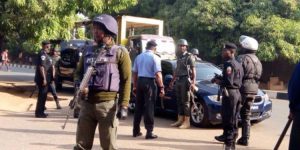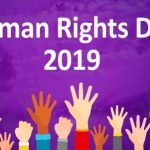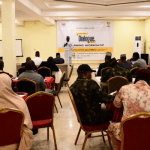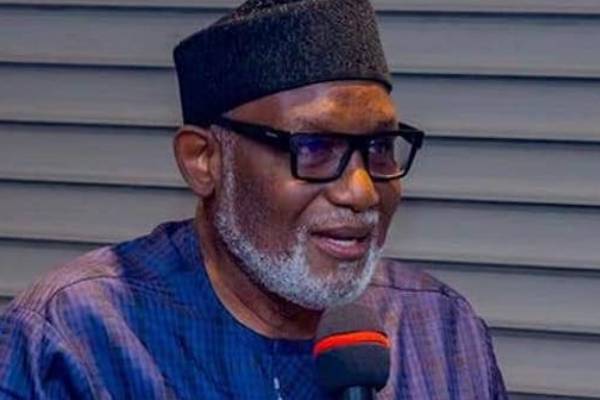The National Human Rights Commission, NHRC has commenced a two-day training for some personnel of the Nigeria Police Force regarding the observance of human rights during its operation.
Speaking at the opening ceremony of the two-day training in Abuja on Wednesday, the Commission’s Director of Civil and Political Rights, Abdul-Rahman Yakubu, stated that human rights will boost the performance of the Nigerian Police Force if they are integrated into their operations.
Several police officers attended the workshop including the Assistant Commissioner of Police, of the Criminal Investigation Department, Plateau State Command, Bawa Saleh.

The Commission said police operatives should arrest only if there is a court order approving it.
Several police officers attended the workshop including the Assistant Commissioner of Police, of the Criminal Investigation Department, Plateau State Command, Bawa Saleh.
The Commission said police operatives should arrest only if there is a court order approving it.
Other reasons that makes arrest legitimate, as stated by the Commission, partly includes: ” Upon reasonable suspicion of having committed a crime, when the person is a flight risk, when the person is likely to commit another offence, depending on the seriousness of the offence, where the person’s safety or other people’s safety is at risk, if the person may interfere with witnesses; when there is a law that mandates an arrest for the offense.”
The Commission urged that those arrested must be treated humanely and that in no circumstances should such people be subjected to greater force than is necessary to restrain them.
” Indiscriminate or unnecessary use of force in an arrest situation is unacceptable and officers will be personally accountable for such improper use.”
Earlier, the NHRC Executive Secretary, Tony Ojukwu SAN, said in his address that the training was necessary due to the unfolding security challenges in the country alongside the important role of the police as enshrined in the Police Act.
He also agreed that in Nigeria, human rights protection is more important in law enforcement and military operations.
He expressed hope that police officers will conduct their jobs in accordance with human rights, while also condoling with policemen who had “paid the Supreme price in the process of policing.”
The National Human Rights Commission, NHRC has commenced a two-day training for some personnel of the Nigeria Police Force regarding the observance of human rights during its operation.
Speaking at the opening ceremony of the two-day training in Abuja on Wednesday, the Commission’s Director of Civil and Political Rights, Abdul-Rahman Yakubu, stated that human rights will boost the performance of the Nigerian Police Force if they are integrated into their operations.
Several police officers attended the workshop including the Assistant Commissioner of Police, of the Criminal Investigation Department, Plateau State Command, Bawa Saleh.

The Commission said police operatives should arrest only if there is a court order approving it.
Several police officers attended the workshop including the Assistant Commissioner of Police, of the Criminal Investigation Department, Plateau State Command, Bawa Saleh.
The Commission said police operatives should arrest only if there is a court order approving it.
Other reasons that makes arrest legitimate, as stated by the Commission, partly includes: ” Upon reasonable suspicion of having committed a crime, when the person is a flight risk, when the person is likely to commit another offence, depending on the seriousness of the offence, where the person’s safety or other people’s safety is at risk, if the person may interfere with witnesses; when there is a law that mandates an arrest for the offense.”
The Commission urged that those arrested must be treated humanely and that in no circumstances should such people be subjected to greater force than is necessary to restrain them.
” Indiscriminate or unnecessary use of force in an arrest situation is unacceptable and officers will be personally accountable for such improper use.”
Earlier, the NHRC Executive Secretary, Tony Ojukwu SAN, said in his address that the training was necessary due to the unfolding security challenges in the country alongside the important role of the police as enshrined in the Police Act.
He also agreed that in Nigeria, human rights protection is more important in law enforcement and military operations.
He expressed hope that police officers will conduct their jobs in accordance with human rights, while also condoling with policemen who had “paid the Supreme price in the process of policing.”
The National Human Rights Commission, NHRC has commenced a two-day training for some personnel of the Nigeria Police Force regarding the observance of human rights during its operation.
Speaking at the opening ceremony of the two-day training in Abuja on Wednesday, the Commission’s Director of Civil and Political Rights, Abdul-Rahman Yakubu, stated that human rights will boost the performance of the Nigerian Police Force if they are integrated into their operations.
Several police officers attended the workshop including the Assistant Commissioner of Police, of the Criminal Investigation Department, Plateau State Command, Bawa Saleh.

The Commission said police operatives should arrest only if there is a court order approving it.
Several police officers attended the workshop including the Assistant Commissioner of Police, of the Criminal Investigation Department, Plateau State Command, Bawa Saleh.
The Commission said police operatives should arrest only if there is a court order approving it.
Other reasons that makes arrest legitimate, as stated by the Commission, partly includes: ” Upon reasonable suspicion of having committed a crime, when the person is a flight risk, when the person is likely to commit another offence, depending on the seriousness of the offence, where the person’s safety or other people’s safety is at risk, if the person may interfere with witnesses; when there is a law that mandates an arrest for the offense.”
The Commission urged that those arrested must be treated humanely and that in no circumstances should such people be subjected to greater force than is necessary to restrain them.
” Indiscriminate or unnecessary use of force in an arrest situation is unacceptable and officers will be personally accountable for such improper use.”
Earlier, the NHRC Executive Secretary, Tony Ojukwu SAN, said in his address that the training was necessary due to the unfolding security challenges in the country alongside the important role of the police as enshrined in the Police Act.
He also agreed that in Nigeria, human rights protection is more important in law enforcement and military operations.
He expressed hope that police officers will conduct their jobs in accordance with human rights, while also condoling with policemen who had “paid the Supreme price in the process of policing.”
The National Human Rights Commission, NHRC has commenced a two-day training for some personnel of the Nigeria Police Force regarding the observance of human rights during its operation.
Speaking at the opening ceremony of the two-day training in Abuja on Wednesday, the Commission’s Director of Civil and Political Rights, Abdul-Rahman Yakubu, stated that human rights will boost the performance of the Nigerian Police Force if they are integrated into their operations.
Several police officers attended the workshop including the Assistant Commissioner of Police, of the Criminal Investigation Department, Plateau State Command, Bawa Saleh.

The Commission said police operatives should arrest only if there is a court order approving it.
Several police officers attended the workshop including the Assistant Commissioner of Police, of the Criminal Investigation Department, Plateau State Command, Bawa Saleh.
The Commission said police operatives should arrest only if there is a court order approving it.
Other reasons that makes arrest legitimate, as stated by the Commission, partly includes: ” Upon reasonable suspicion of having committed a crime, when the person is a flight risk, when the person is likely to commit another offence, depending on the seriousness of the offence, where the person’s safety or other people’s safety is at risk, if the person may interfere with witnesses; when there is a law that mandates an arrest for the offense.”
The Commission urged that those arrested must be treated humanely and that in no circumstances should such people be subjected to greater force than is necessary to restrain them.
” Indiscriminate or unnecessary use of force in an arrest situation is unacceptable and officers will be personally accountable for such improper use.”
Earlier, the NHRC Executive Secretary, Tony Ojukwu SAN, said in his address that the training was necessary due to the unfolding security challenges in the country alongside the important role of the police as enshrined in the Police Act.
He also agreed that in Nigeria, human rights protection is more important in law enforcement and military operations.
He expressed hope that police officers will conduct their jobs in accordance with human rights, while also condoling with policemen who had “paid the Supreme price in the process of policing.”
The National Human Rights Commission, NHRC has commenced a two-day training for some personnel of the Nigeria Police Force regarding the observance of human rights during its operation.
Speaking at the opening ceremony of the two-day training in Abuja on Wednesday, the Commission’s Director of Civil and Political Rights, Abdul-Rahman Yakubu, stated that human rights will boost the performance of the Nigerian Police Force if they are integrated into their operations.
Several police officers attended the workshop including the Assistant Commissioner of Police, of the Criminal Investigation Department, Plateau State Command, Bawa Saleh.

The Commission said police operatives should arrest only if there is a court order approving it.
Several police officers attended the workshop including the Assistant Commissioner of Police, of the Criminal Investigation Department, Plateau State Command, Bawa Saleh.
The Commission said police operatives should arrest only if there is a court order approving it.
Other reasons that makes arrest legitimate, as stated by the Commission, partly includes: ” Upon reasonable suspicion of having committed a crime, when the person is a flight risk, when the person is likely to commit another offence, depending on the seriousness of the offence, where the person’s safety or other people’s safety is at risk, if the person may interfere with witnesses; when there is a law that mandates an arrest for the offense.”
The Commission urged that those arrested must be treated humanely and that in no circumstances should such people be subjected to greater force than is necessary to restrain them.
” Indiscriminate or unnecessary use of force in an arrest situation is unacceptable and officers will be personally accountable for such improper use.”
Earlier, the NHRC Executive Secretary, Tony Ojukwu SAN, said in his address that the training was necessary due to the unfolding security challenges in the country alongside the important role of the police as enshrined in the Police Act.
He also agreed that in Nigeria, human rights protection is more important in law enforcement and military operations.
He expressed hope that police officers will conduct their jobs in accordance with human rights, while also condoling with policemen who had “paid the Supreme price in the process of policing.”
The National Human Rights Commission, NHRC has commenced a two-day training for some personnel of the Nigeria Police Force regarding the observance of human rights during its operation.
Speaking at the opening ceremony of the two-day training in Abuja on Wednesday, the Commission’s Director of Civil and Political Rights, Abdul-Rahman Yakubu, stated that human rights will boost the performance of the Nigerian Police Force if they are integrated into their operations.
Several police officers attended the workshop including the Assistant Commissioner of Police, of the Criminal Investigation Department, Plateau State Command, Bawa Saleh.

The Commission said police operatives should arrest only if there is a court order approving it.
Several police officers attended the workshop including the Assistant Commissioner of Police, of the Criminal Investigation Department, Plateau State Command, Bawa Saleh.
The Commission said police operatives should arrest only if there is a court order approving it.
Other reasons that makes arrest legitimate, as stated by the Commission, partly includes: ” Upon reasonable suspicion of having committed a crime, when the person is a flight risk, when the person is likely to commit another offence, depending on the seriousness of the offence, where the person’s safety or other people’s safety is at risk, if the person may interfere with witnesses; when there is a law that mandates an arrest for the offense.”
The Commission urged that those arrested must be treated humanely and that in no circumstances should such people be subjected to greater force than is necessary to restrain them.
” Indiscriminate or unnecessary use of force in an arrest situation is unacceptable and officers will be personally accountable for such improper use.”
Earlier, the NHRC Executive Secretary, Tony Ojukwu SAN, said in his address that the training was necessary due to the unfolding security challenges in the country alongside the important role of the police as enshrined in the Police Act.
He also agreed that in Nigeria, human rights protection is more important in law enforcement and military operations.
He expressed hope that police officers will conduct their jobs in accordance with human rights, while also condoling with policemen who had “paid the Supreme price in the process of policing.”
The National Human Rights Commission, NHRC has commenced a two-day training for some personnel of the Nigeria Police Force regarding the observance of human rights during its operation.
Speaking at the opening ceremony of the two-day training in Abuja on Wednesday, the Commission’s Director of Civil and Political Rights, Abdul-Rahman Yakubu, stated that human rights will boost the performance of the Nigerian Police Force if they are integrated into their operations.
Several police officers attended the workshop including the Assistant Commissioner of Police, of the Criminal Investigation Department, Plateau State Command, Bawa Saleh.

The Commission said police operatives should arrest only if there is a court order approving it.
Several police officers attended the workshop including the Assistant Commissioner of Police, of the Criminal Investigation Department, Plateau State Command, Bawa Saleh.
The Commission said police operatives should arrest only if there is a court order approving it.
Other reasons that makes arrest legitimate, as stated by the Commission, partly includes: ” Upon reasonable suspicion of having committed a crime, when the person is a flight risk, when the person is likely to commit another offence, depending on the seriousness of the offence, where the person’s safety or other people’s safety is at risk, if the person may interfere with witnesses; when there is a law that mandates an arrest for the offense.”
The Commission urged that those arrested must be treated humanely and that in no circumstances should such people be subjected to greater force than is necessary to restrain them.
” Indiscriminate or unnecessary use of force in an arrest situation is unacceptable and officers will be personally accountable for such improper use.”
Earlier, the NHRC Executive Secretary, Tony Ojukwu SAN, said in his address that the training was necessary due to the unfolding security challenges in the country alongside the important role of the police as enshrined in the Police Act.
He also agreed that in Nigeria, human rights protection is more important in law enforcement and military operations.
He expressed hope that police officers will conduct their jobs in accordance with human rights, while also condoling with policemen who had “paid the Supreme price in the process of policing.”
The National Human Rights Commission, NHRC has commenced a two-day training for some personnel of the Nigeria Police Force regarding the observance of human rights during its operation.
Speaking at the opening ceremony of the two-day training in Abuja on Wednesday, the Commission’s Director of Civil and Political Rights, Abdul-Rahman Yakubu, stated that human rights will boost the performance of the Nigerian Police Force if they are integrated into their operations.
Several police officers attended the workshop including the Assistant Commissioner of Police, of the Criminal Investigation Department, Plateau State Command, Bawa Saleh.

The Commission said police operatives should arrest only if there is a court order approving it.
Several police officers attended the workshop including the Assistant Commissioner of Police, of the Criminal Investigation Department, Plateau State Command, Bawa Saleh.
The Commission said police operatives should arrest only if there is a court order approving it.
Other reasons that makes arrest legitimate, as stated by the Commission, partly includes: ” Upon reasonable suspicion of having committed a crime, when the person is a flight risk, when the person is likely to commit another offence, depending on the seriousness of the offence, where the person’s safety or other people’s safety is at risk, if the person may interfere with witnesses; when there is a law that mandates an arrest for the offense.”
The Commission urged that those arrested must be treated humanely and that in no circumstances should such people be subjected to greater force than is necessary to restrain them.
” Indiscriminate or unnecessary use of force in an arrest situation is unacceptable and officers will be personally accountable for such improper use.”
Earlier, the NHRC Executive Secretary, Tony Ojukwu SAN, said in his address that the training was necessary due to the unfolding security challenges in the country alongside the important role of the police as enshrined in the Police Act.
He also agreed that in Nigeria, human rights protection is more important in law enforcement and military operations.
He expressed hope that police officers will conduct their jobs in accordance with human rights, while also condoling with policemen who had “paid the Supreme price in the process of policing.”














